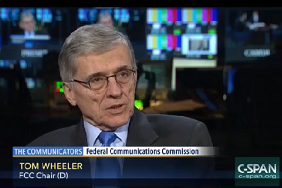Wheeler on 'General Conduct Standard': Everybody into the Crucible

FCC Chairman Tom Wheeler says the goal of the Open Internet order's general conduct standard is not to be "judgmental," but instead elemental in the sense that it is meant to be a crucible to test and then arrive at what is in the public interest, which he defines as the common good.
In an interview for C-SPAN's Communicators series, Wheeler said the approach is to "instead of preemptively say we know best," say that there are some basic concepts--no blocking, no throttling, no paid prioritization--and transparency about what customers are getting. "And then you put a referee on the field, and the referee has the ability to look at circumstances and throw the flag if necessary."
He called that an entirely different approach from what the FCC used to take, and the kind of approach that it needs to take to encourage "permissionless innovation."
Related: FCC's Wheeler—Spectrum Auction Could Extend Into FY 2017
Asked by The Washington Post's Brian Fung whether, as Republican FCC members have suggested, instead the standard creates regulatory ambiguity that leads to business uncertainty, Wheeler countered that every company would like to have both certainty and monopoly. But markets are inherently uncertain, he said, and "we [the FCC] are engaging in an activity that allows markets to be markets. Yes, that's uncertain."
Wheeler said it is key to have a referee who can say: "No, that's not right." But he said that call was being made on a case-by-case basis, not a "big, broad-brush" approach.
Related: Senators Grill Wheeler on JSAs
Broadcasting & Cable Newsletter
The smarter way to stay on top of broadcasting and cable industry. Sign up below
With that general conduct standard in mind, and at least one net neutrality complaint in hand, Wheeler's staff has been talking to Comcast, AT&T, and others--including public interest groups--about zero rating plans--which exempt some services from usage plan--and says it is still "sorting through" all that information.
He said the FCC ought to be the "crucible" in which those things are tested.
Related: Broadband Labels Draw Eyeballs
Wheeler said his idea of the public interest the FCC is meant to serve is the common good, which is the reason for that crucible and that input.
Wheeler said he remained confident in the outcome of the court challenge of the FCC's Open Internet order.
Asked to respond to a Wall Street Journal report about the White House's efforts to push a Title II solution, Wheeler said he did not remember the details, but said the White House always runs its own process" and that the FCC is "its own agency that was running our process."
Wheeler said the FCC was about to put out its proposal on updating the special access (business broadband) marketplace, but was mum on its contents.
The chairman signaled he is not a big supporter of changing the sunshine rules to allow more than two commissioners--the chairman is a commissioner--to meet outside of public meetings. He conceded it was frustrating, and said there "might, possibly" be some efficiencies to be gained. But as to whether there was an "urgent" need for change: "It's working," he said, admitting he was kind of a traditionalist, saying the rules they have been under for decades have worked.
Contributing editor John Eggerton has been an editor and/or writer on media regulation, legislation and policy for over four decades, including covering the FCC, FTC, Congress, the major media trade associations, and the federal courts. In addition to Multichannel News and Broadcasting + Cable, his work has appeared in Radio World, TV Technology, TV Fax, This Week in Consumer Electronics, Variety and the Encyclopedia Britannica.

